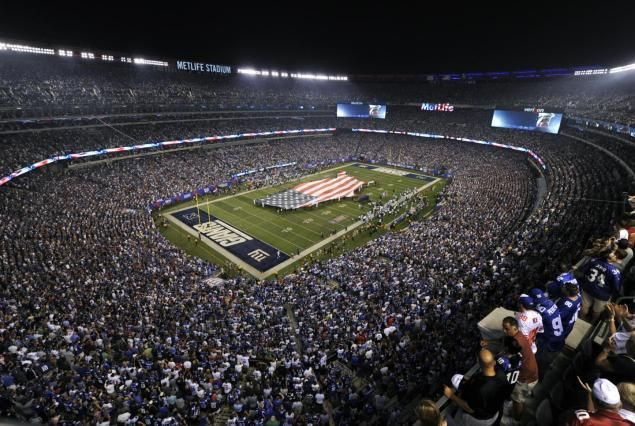How Much Will The Super Bowl Cost Taxpayers? Impact On New York/New Jersey Residents In 2014

On Sunday, Super Bowl XLVIII will descend upon MetLife Stadium in East Rutherford, N.J., with the force of a thousand polar vortexes. And while more than 100 million eyeballs are expected to be glued to their TVs that evening, it’s worth pointing out that not everyone will be watching the big game. (A rerun of “America’s Funniest Home Videos” is on ABC if anyone’s interested.)
But whether you care about the Super Bowl or not -- if you live in New York or New Jersey, you’re paying for it, and not just with traffic disruptions and rowdy bar-goers. Taxpayers in both states will have to shoulder some of the burden: Security, mass transit, local promotions -- it all costs money, and the region is apparently sparing no expense.
Exactly how much the tax bill will come to is difficult to nail down, particularly since the game and affiliated events span two states and the country’s most populous metropolitan region. On Saturday, the Asbury Park Press estimated that the residents of New Jersey, where the game takes place, will bear a bill of at least $17.7 million in tax costs. New Jersey Transit, the Press writes, is expecting to handle the needs of 12,000 commuters to MetLife Stadium -- that’s 4,000 more than would typically travel to a Giants or Jets game, which means extra trains and a reinforced infrastructure. In all, the transit agency has allocated $5.3 million for game-related expenses, including those associated with additional train and bus service, the Press writes.
And all those people traversing the Garden State will need to be kept safe. The Press writes that an estimated 700 additional NJ State Troopers will hit the streets on the day of the big game. NJ Transit and the Port Authority will also be stepping up security.
New Jersey is bearing the brunt of the Super Bowl storm, but New Yorkers are by no means off the hook. The Times Union of Albany reported on Sunday that taxpayers in the Empire State are underwriting the costs for Super Bowl celebrations in Times Square, as well as numerous promotional undertakings throughout the city and region. Those include the $2.5 million Times Square event, $1 million for a vehicle to drive around and promote the big game and $500,000 for a press event at Manhattan’s Chelsea Piers. In all, New York Gov. Andrew Cuomo secured $5 million in the state budget for the New York/New Jersey Super Bowl XLVIII Host Committee.
Granted, the NFL has estimated that the Super Bowl will be an “economic boom” for the New York/New Jersey region, boosting the economy from $500 million to $600 million. If accurate, that number would likely justify the tax burdens illustrated above, at least in the eyes of most residents. The problem is, the NFL has long been known to inflate its estimates on economic impact, significantly so. In 2000, for instance, a study by Lake Forest College in Illinois found that the Super Bowl in Miami that year brought in just $37 million in increased economic activity, as the Associated Press reported on Monday. By the NFL’s estimate, that same game (between the Denver Broncos and Atlanta Falcons) generated more than 10 times that amount. More recently, Andrew Zimbalist, a Smith College sports economist, told the Star-Ledger that the estimate being thrown around this year is based on “false science.”
“The most likely thing that you should conclude from all of this is that you should take the NFL numbers and move the decimal point over one space, and then you get a more reasonable number,” he told the newspaper. “So instead of $500 million, think more like $50 million.”
Given the excitement over Sunday’s game, it was probably inevitable that some sober tax talkers would come along and kill the buzz. Death and taxes have always gone together. Football fits in there pretty nicely, too.
Got a news tip? Email me. Follow me on Twitter @christopherzara.
© Copyright IBTimes 2024. All rights reserved.






















